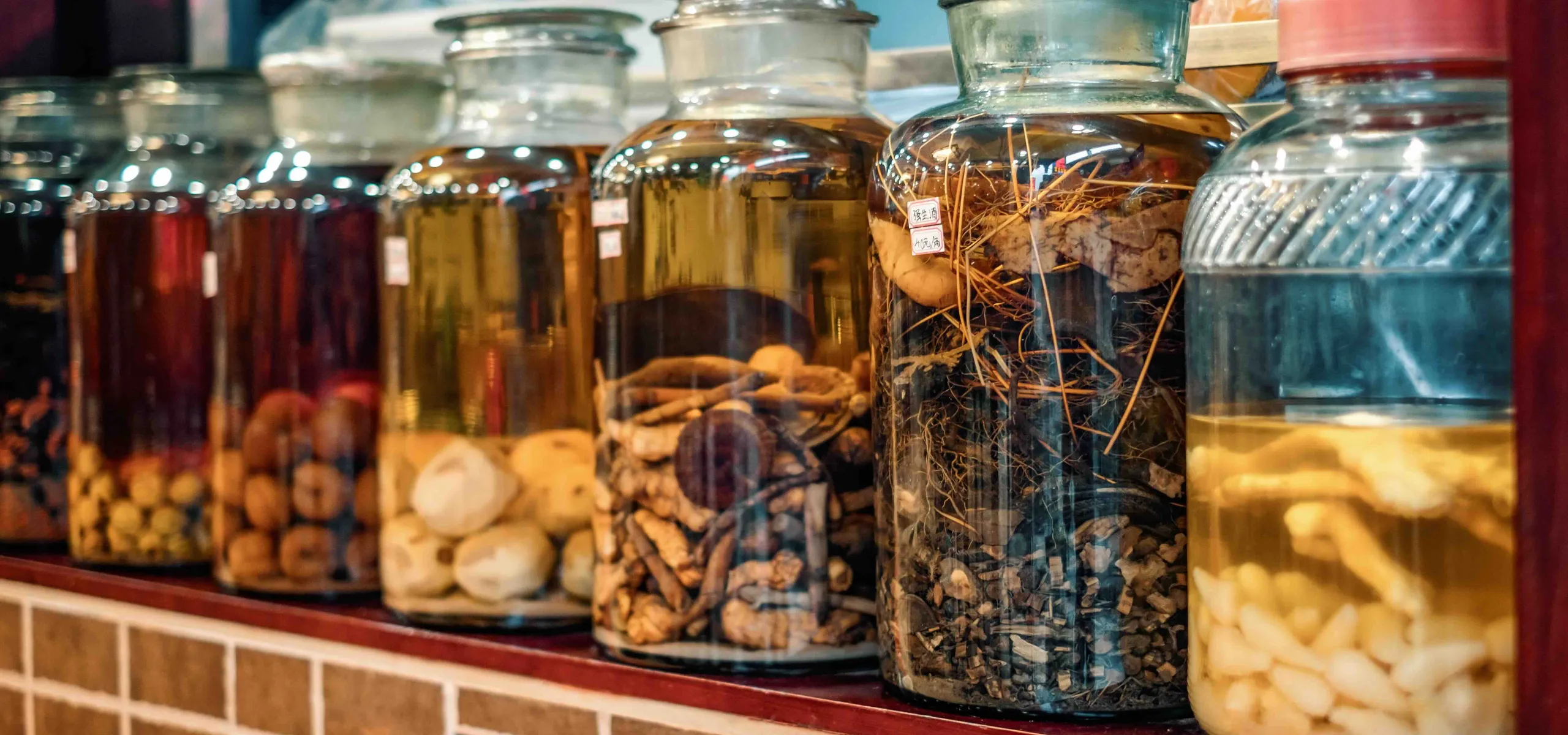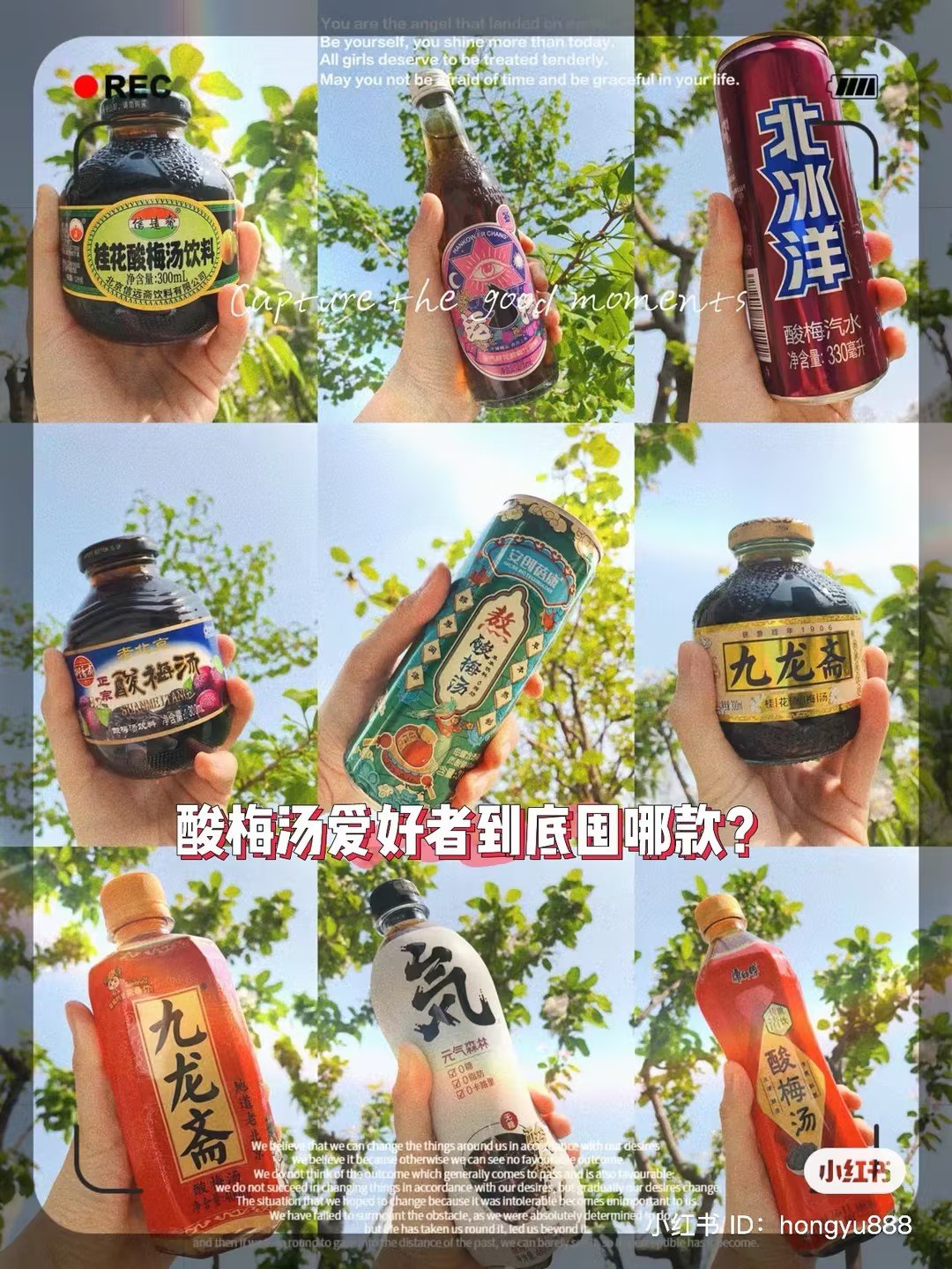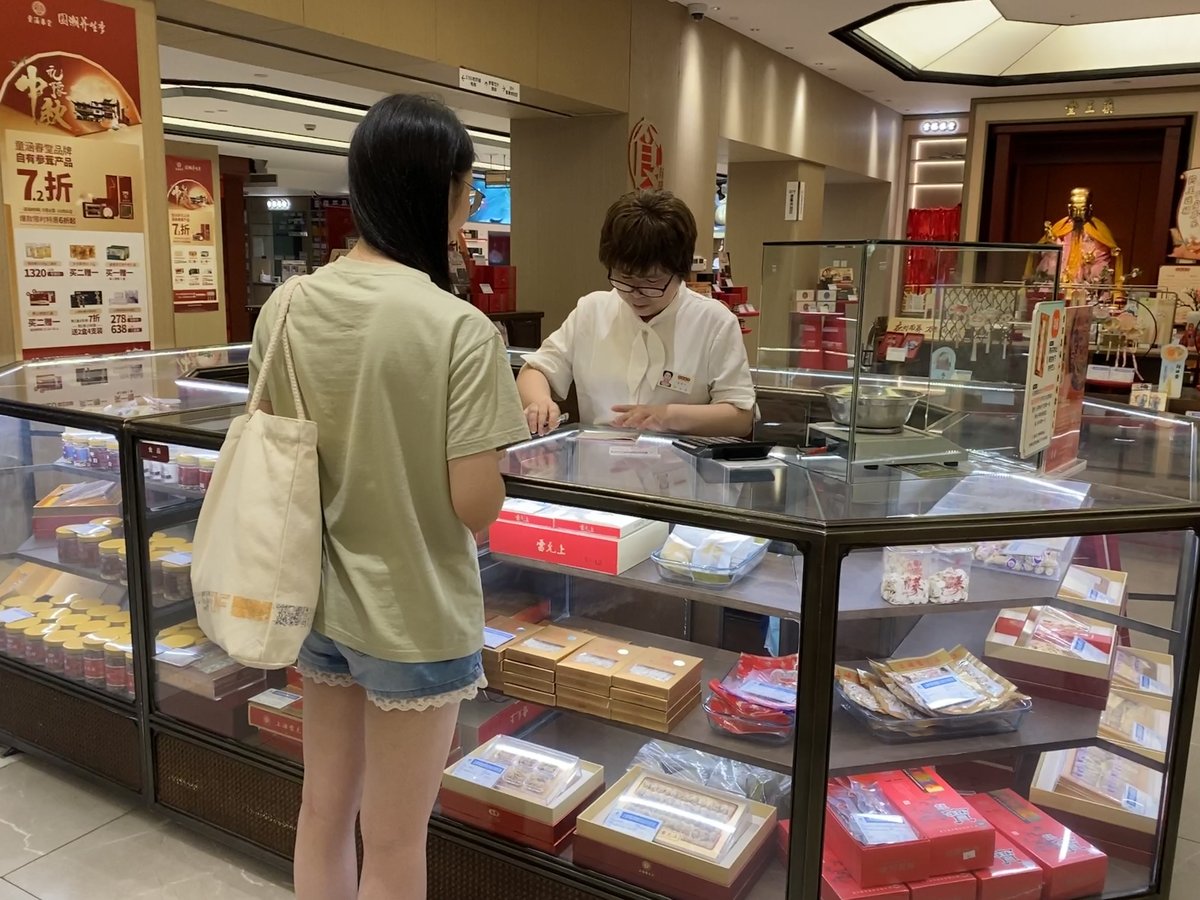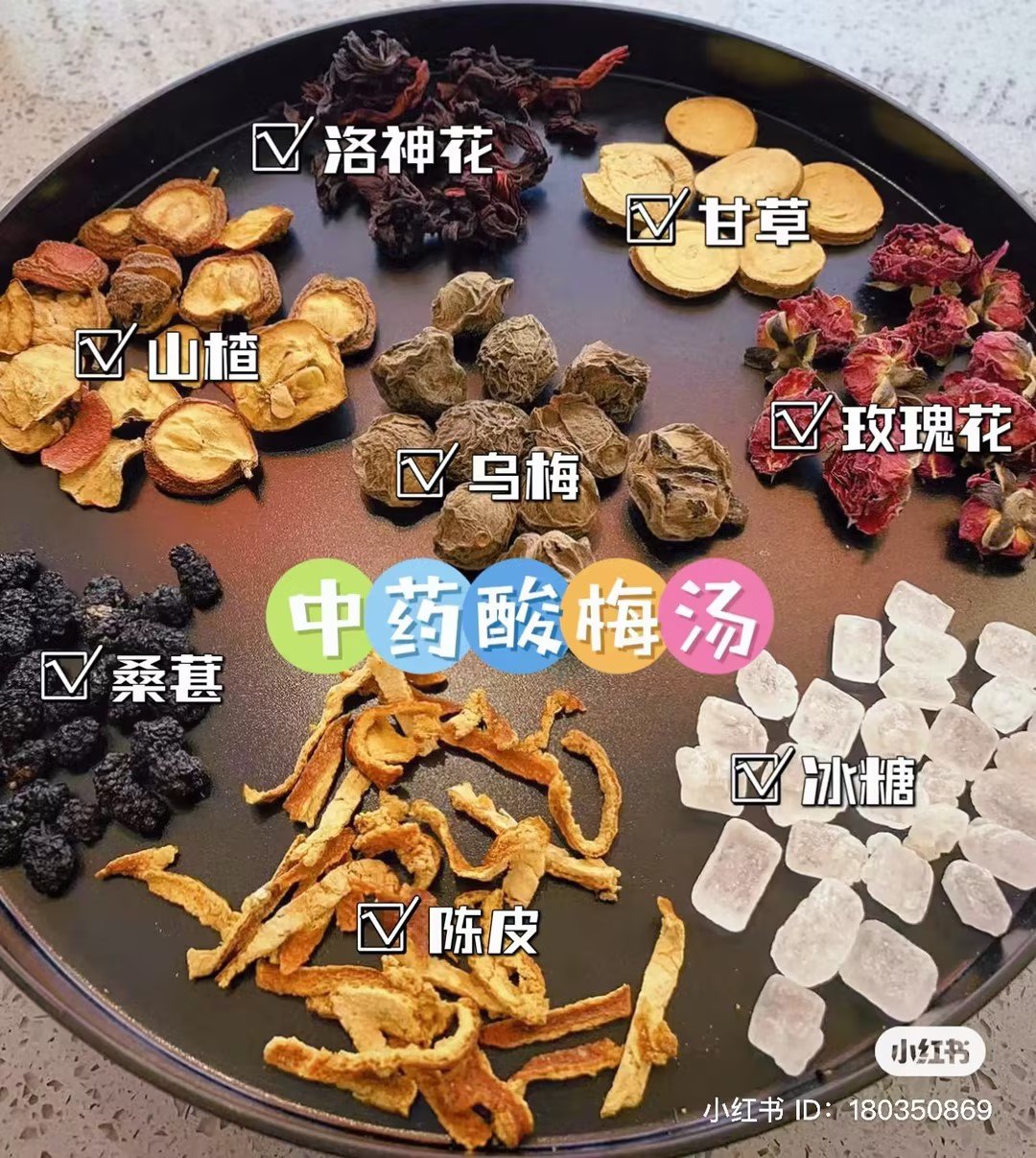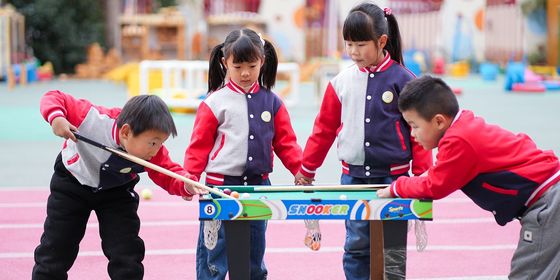Forget bubble tea, traditional Chinese medicine is the latest trend among youth
For many young Chinese, being forced to swallow traditional Chinese medicine (TCM) to treat a fever or a cough is a bitter childhood memory. But today, the same herbal brews are sold in stylish cups at pharmacies, some of whom have installed trendy cafe counters to cater to youngsters who want to keep that healthy glow after late nights in the office or on the dance floor.
No longer just associated with the healthy living habits of the elderly, herbal remedies, folk medicine, and medicinal drinks like suanmeitang (酸梅汤, sour plum juice) and goji berry tea are being embraced by Gen Z consumers seeking a cost-effective antidote for their modern lifestyles.
Last year, “Whole Ginseng Water,” a beverage that contains an entire ginseng root in each bottle and claims to reduce the ill effects of staying up late, reportedly sold 10,000 bottles a day when it hit the Chinese market. On the e-commerce platform Taobao, a goji berry drink produced by Tong Ren Tang Group, one of China’s oldest TCM brands, promises to improve one’s liver functions and eyesight and has sold out more than 40,000 orders from a single pharmacy at the time of writing.
“At the height of the season, we sold 800 orders a day,” 36-year-old Jiang Xu, the co-founder of a TCM beverage chain called “Prescribe a Remedy” in eastern China’s Jiangsu province, boasts to TWOC. Jiang used to sell milk tea but turned to TCM beverages when she noticed that young consumers were sounding the alarm about obesity. “Unlike milk tea, TCM drinks are healthier and free of chemical additives. It caters to the health preservation demand of young people,” Jiang says.
Health consciousness among young Chinese seems to have risen since the pandemic. On Xiaohongshu, a lifestyle app catering to a young user base, there are over 9 million posts with the keywords “health preservation (养生)” and over 1.67 million posts related to “TCM.” According to a survey by DT Finance, a financial data company, in 2022, 60.8 percent of young people felt “health” had become more important to them after the three-year pandemic, more than the percentage who felt “freedom” or “stability in life” had become more important.
Traditional TCM businesses are benefiting from this trend. Suanmeitang, a beverage credited with treating coughs and relieving heatstroke in the 16th-century medical encyclopedia Compendium of Materia Medica (《本草纲目》), saw a surge in interest during the heat waves this past summer. After several online influencers shared their experiences of buying low-cost suanmeitang, many people flocked to TCM pharmacies to try the tasty drink.
On Weibo, China’s Twitter-liked microblogging platform, the Zhejiang Provincial Hospital of TCM reported receiving 60,000 orders of suanmeitang that sold for 1.34 yuan per package. The hospital’s online pharmacy system, unable to cope with the increased traffic, crashed several times.
“We believe there’s huge potential in the TCM industry,” Jiang says. She opened her first shop in April and a second one in September, and says the investment has turned out to be a success. “People line up to try our TCM beverages, and we’re too busy with orders to start a takeaway service.”
Generation anxious
Some young consumers attribute their interest in TCM to the heavy pressure they face in society. Zhong Shangyun, a 22-year-old university graduate, began to drink medicinal beverages when she noticed several unhealthy symptoms like feeling exhausted and dizzy all day a year ago. “I went through a particularly stressful period when I was preparing for the postgraduate entrance exam while also looking for a job,” she tells TWOC. “I’d stay up until 3 in the morning and I had enormous worries. I feel it destroyed my body.”
As China’s youth unemployment rate rises, young people are facing growing pressure in the workplace and at home. The grueling “996” system in Chinese tech companies—so-called because employees work from 9 a.m. to 9 p.m. six days a week—gives young employees little time to rest or exercise, while the intense competition for jobs leaves them afraid to insist on breaks or resign.
Diseases typically associated with older age groups are on the rise among young people. According to an article published in August by researchers at Tsinghua Changgeng Hospital, a public hospital associated with one of Chna’s top universities, the main demographic killed by sudden cardiac arrest is shifting from those over the age of 40 to those between 30 and 40. In July 2022, the death of a 22-year-old woman in Hangzhou, Zhejiang province, from cardiac arrest after working late for six consecutive days led to calls among the public for shorter working hours and better health monitoring for young people.
“It’s horrible to see those diseases once highly prevalent in older people appear in younger generations,” says Zhong. “Some people are joking that we’re ‘fragile college students,’ as nowadays even students in their 20s can get hurt easily from a tiny accident.”
Under these pressures, TCM has become a cost-effective way for young people to treat some anxiety-induced conditions physically and mentally. “We’re more familiar with TCM, and it is supposed to have the ability to treat some diseases that modern medicine cannot distinguish and cure,” says Zhao Jiamin. The 20-year-old from Zhejiang province uses Chinese herbs to recuperate from tiredness and also practices traditional Chinese qigong to keep healthy. “I believe the effectiveness of TCM lies in treating the root cause, rather than the superficial effects of Western medicine. It works slow but has fewer side effects.”
Online content creators are riding the wave of young people’s new interest in TCM. One Xiaohongshu channel called “Centenarian Training Program,” with 436,000 followers on the platform, introduces various health and longevity tips for college students and office workers via whimsical cartoons. These include moxibustion to combat long-term exposure to air conditioning and other “cold” illnesses classified by TCM, and having a daily bowel movement during a “golden hour” to eliminate toxins. Other channels recommend drinks to regulate “damp” qi in one’s body and practicing qigong to improve one’s health.
Modernizing the traditional
TCM treatments popularized by social media have significant differences from ancient health concepts. One obvious trend is the mixing of TCM with more palatable food and drinks to cater to modern consumers’ tastes. In 2019, Tong Ren Tang opened a coffee shop in Beijing and started a TCM-themed restaurant in 2021 serving yaoshan (药膳), or dishes infused with herbs to achieve certain health effects. The Harbin Jiren TCM Hospital in China’s Northeast also operates a coffee shop on the premises, where people can order coffee infused with herbs or even add ice cubes—normally a taboo in traditional medicine.
Without these improvements, the bitter taste of traditional herbal drinks makes them a hard sell for some customers. “We tried many different remedies and consulted several experienced TCM doctors to find a balanced type of TCM drink,” Jiang Xu, the TCM beverage chain owner, tells TWOC.
In addition to businesses like Jiang’s, research on how to make TCM more palatable to young people is also receiving increasing attention from the academic community. A project under the National Natural Science Foundation of China, chaired by Chen Shaofang and Liang Huiqing, is dedicated to the study of improving the taste of Chinese medicine. The goal is to invent a product similar to Nestle’s Coffee-Mate for Chinese medicine, adding sweeteners and aromatics to herbal remedies to improve their taste.
“Although the old saying goes, ‘good medicine tastes bitter,’ we are now studying how to make TCM accepted by a wider audience,” says Gu Yuanye, a 23-year-old student majoring in TCM at the Beijing University of Chinese Medicine. “Chinese medicine is undergoing a transformation to adapt to the times. For example, TCM hospitals are starting to run their own social media accounts to spread knowledge about Chinese medicine and health.”
However, the medicinal properties of these “improved” remedies have been questioned. Most traditional medicines are not meant to be consumed cold, as this supposedly reduces their efficacy, while a 2014 article by the Beijing Pharmaceutical Association suggested that adding sugar to herbal tonics can affect the balance of the ingredients and reduce the medicine’s impact. Nowadays, however, sweetened and chilled Chinese medicine drinks are all the rage.
As TCM becomes an internet meme, there’s an increased risk of overusing or abusing it. According to TCM theory, medicines are “three parts poison and seven parts cure.” “We don’t recommend drinking medication as a beverage,” says Gu, who has been studying TCM for over four years now. “Take suanmeitang as an example, although it can help to improve appetite, the excessive drink may lead to hyperacidity, and excessive consumption of ginseng can also lead to nosebleeds.”
Gu believes the future of TCM research lies in “enhancing the awareness and knowledge of Chinese medicine among young people.” He hopes to apply his university knowledge to studying the application of traditional treatments in areas where modern medical technology is impractical. “The current problem is that the wisdom of TCM is difficult to explain in the theory of modern medicine. So there’s still a long way to go for TCM to adapt to modern Chinese society.”





